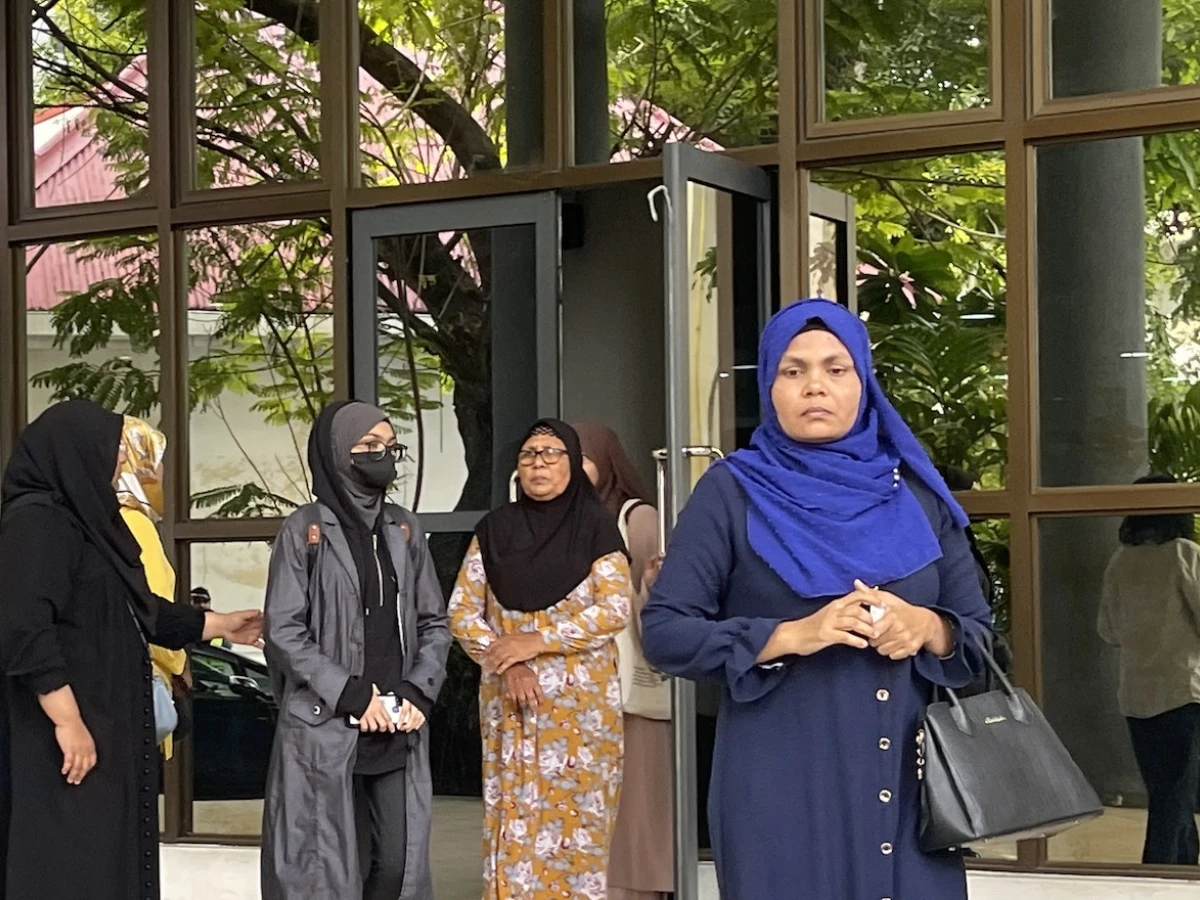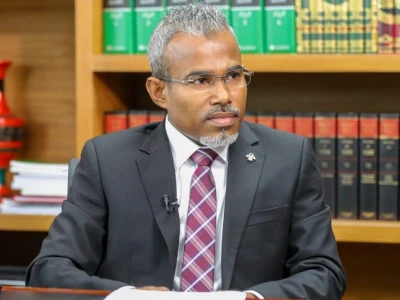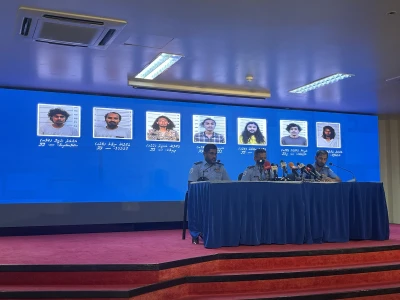
State says postmortem allowed without court order
After the hearing, the family members told Atoll Times that police had not informed the family that the body would be sent abroad on Monday.
Top Stories
By
Mohamed Muzayyin Nazim
The state told the Civil Court on Saturday that a court order is not required under the circumstances to conduct a postmortem for Abdulla Rasheed, who died in police custody, as it is a power vested with the police under the relevant law and regulations.
Following this, the Prosecutor General's Office has requested that a decision be taken before that as the body needs to be sent abroad on Monday.
Judge Hassan Faheem Ibrahim said that a decision in such cases should be made within a maximum of 14 days. He, however, said he would try to make a decision by Monday.
The Drug Enforcement Department (DED) police arrested Abdulla Rasheed, 43, in a major drug operation conducted in Gaafu Dhaalu atoll. Three people, including Abdulla, were arrested from GDh. Hoadehdhoo around 3pm on Tuesday. While on route to another location, Abdullah died on the boat.
-
Local eye witnesses claim that police obstructed his treatment despite his saying repeatedly that he was having chest pains
-
Family alleges that police negligence led to his death
-
Abdullah's postmortem will be conducted as part of a joint investigation by the National Integrity Commission (NIC) and the police into the death, but his family has been opposing it.
Abdulla's mother Maryam Ahmed, Maraga/G.Dh.Hoadehdhoo, has filed a case in the Civil Court contesting the police decision to conduct a postmortem on Abdulla. The first hearing in the case was held on Saturday. The request on behalf of the mother was:
-
to prevent postmortem from being conducted
-
to hand over the body to make arrangements for the burial at the earliest
Attorney Mohammad Ragib, appearing for Abdulla's family in the case, said the family was reluctant to conduct the post-mortem due to four main reasons.
-
1-
As the family did not want Abdulla's body to be damaged any more
-
2-
The decision to conduct postmortem has not been shared with the family so far
-
3-
Islamic jurisprudence encourages early burial of a Muslim after his death
-
4-
It is the right of the heirs of the deceased; no post-mortem can be conducted without family's consent
During the hearing, which was attended by 11 family members, including Abdulla's mother and his wife, Ragib sought an order directing the police to stop conducting the postmortem and hand over the body to the family to arrange for Abdullah's last rites at the earliest.
'If order is issued, investigation will be hampered'
Ibrahim Shaneen Ahmed, the state attorney at the Attorney General's Office which represented the police, said the NIC had taken the lead in conducting a criminal investigation in collaboration with the police, into the death. He added that the decision to conduct the postmortem was taken by the NIC and it was being done as per the laid down procedure at the request of the commission.
As the reasons why a post-mortem is important, Shaneen said:
-
Since the family and the public are levelling allegations against the police in connection with the death
-
As it is important to know the cause of the death to maintain the trust in police
-
It is essential to do it for the purpose of investigation; that is, the power given to the police by law and order
"If such an order is passed, the criminal investigation will be severely hampered... The local police service does not believe that there is a place [situation] where such an order can be issued," Shinan said, referring to the family's order to hand over Abdullah's body.
Postmortem allowed without order: PG office
The PG office, which intervened in the case, said that the NIC and the police were empowered to conduct a postmortem without a warrant.
The counsel for the PG office argued that in such circumstances, the police would have the power to conduct a post-mortem even without a court order under the provisions of the Code of Criminal Procedure.
According to Section 97 of the Police Act, a court order is required for a post-mortem:
-
Unless otherwise specified in any other law, the police are empowered to conduct examination or autopsy of the body of a person by a court order for the purpose of ongoing investigation.
Ragib, who appeared for the family, and advocate Mohammad Shahuneem, also took note of it.
Shahuneem said that in such a situation, if a postmortem is to be conducted, it has to be done with a court order.
Advocate Farhanaz Mohammad, appearing for the state, quoted Sections 1-75 of the Code of Criminal Procedure, section D:
-
If a criminal case is registered against a deceased person, the police are empowered to conduct a postmortem of the body to ascertain the cause of death and ascertain the exact nature of the deaths.
-
A rule specifying these procedures shall be framed and published in the government gazette upon the enactment of the Act
Section 4 of the law, which came into effect in May 2021, empowers the police to conduct post-mortems in six types of murder cases.
Farhanaz said the six categories include cases where a person is alleged to have died due to negligence and the police can conduct postmortems with statutory powers even without a court order.
Farhanaz noted:
-
The police and NIC acted as per procedure in the case
-
A major criminal investigation is underway in coordination with the police and NIC
-
In the joint investigation, the NIC had sought a postmortem, but under Section 76 of the Code of Criminal Procedure, the postmortem is conducted through the police
-
It is important for the investigation to ascertain the cause of his death
"Therefore, the state is of the considered view that issuing such an order [handing over of the body to the family] would amount to obstruction of justice. There is no place to issue such an order," Farhanaz said.
Shahuneem said the family claimed that Abdulla died due to police negligence, keeping in mind that he had died due to non-performance of police duties. He pointed out that in the Criminal Procedure Code that was quoted by Farhanaz, the police gets this power only when there is a question mark over the murder.
"The state is not in a position to say so. He died in a public place where there were so many people. The family did not say he was tortured. If they had, a proper post-mortem should be conducted or the death is questionable, but that situation is not here," Shahuneem said.
"Abdulla Rasheed died due to a lag in availing him treatment while there was still time, resources and places nearby”.
He said that as of now, the doctor's report suggests that he died of "sudden cardiac arrest" or sudden heart failure. The doctor had declared he was dead 30 minutes before being taken to the health centre.
"So what more will be clear from the postmortem? In what capacity is it that the body has already been kept in the mortuary without any orders?" asked Shahuneem.
He added:
-
The police had an arrest warrant; the court has not decided on the bail
-
The same can be held for the dead body in the mortuary; only possible to detain by court order
-
The manager of Hoadedhdhoo Health Centre had offered to arrange for treatment by bringing in doctors to the jetty that day; but the police had not provided treatment in time
Family in shock
After hearing arguments from both sides, Judge Faheem said that under the law, a decision in such cases has to be taken within a maximum of 14 days, and that he would take a decision on the matter before that. Advocate Shaneen, appearing for the Attorney General's Office, requested that a decision be taken at the earliest.
Advocate Farhanaz, appearing for the petitioner, said they were trying to send Abdulla's body abroad on Monday for postmortem. So, she asked the judge to make a ruling before that.
Judge Faheem said he would try to make a decision before that.
After the hearing, the family members told Atoll Times that police had not informed the family that the body would be sent abroad on Monday. They also expressed concern that his face was yet to be shown to the family.
"It was a big shock. The hearing revealed that the body was being taken on Monday", said Nizada Mohammed, sister of Abdulla Rasheed.
The family's concern was highlighted at a press conference given by the lawyers after the hearing.




